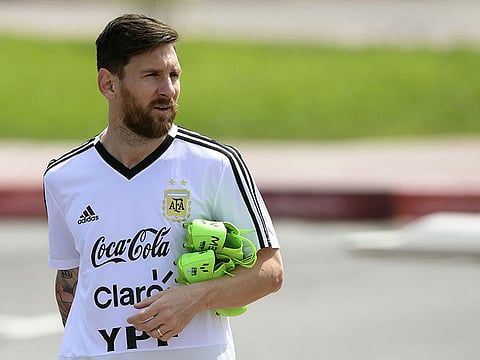Mission impossible for Messi
Argentina’s lack of talent and philosophy mean star man is fighting losing battle

Moscow: Even before the start of the World Cup, the photographs invited mockery.
There was a picture of Lionel Messi gazing into the distance with his right hand on the back of a goat. Another of Messi cradling a kid goat in his arms.
The theme of the Paper magazine shoot and accompanying 2,000-word article was that Messi was football’s GOAT — greatest of all time.
As if it wasn’t bad enough that his performance in this World Cup has contradicted the publication’s assertion, chief rival Cristiano Ronaldo has passive-aggressively mocked him by growing a goatee and stroking his chin when scoring.
Ronaldo scored four times in his first two games of this competition. Messi is yet to score and his tournament will be over unless Argentina defeats Nigeria on Tuesday and Iceland fails to beat already-advanced Croatia.
The disparate positions of the generation’s two best players reflect not their respective abilities or even that of the players around them. Neither has noteworthy support.
What are noticeably different are the mindsets of their teams. Portugal know what they are. Argentina don’t, which explains the reports about players revolting against coach Jorge Sampaoli.
Sampaoli has been criticised for everything from the team’s lack of rhythm to substitution choices, but his greatest failure has been his inability to bestow the team with a sense of identity and purpose.
Whatever their shortcomings, the teams in which Diego Maradona played in the 1986 and 1990 World Cup tournaments had that. The freedom coach Carlos Bilardo granted Maradona was offset by pragmatism in almost every other part of the field. Maradona’s job was to win games, his teammates’ was to not lose them. The strategy could produce football that bordered on unwatchable, as was the case when Argentina were the tournament runners-up in 1990, but it was effective.
Argentina had some of their most well-rounded teams in the era that immediately followed Maradona’s. Argentina continued to play with a No. 10 — the jersey and role inherited by Ariel Ortega, Juan Roman Riquelme and Messi — but started to think of themselves as more than a one-man team. The country is as imprisoned by the memories of those teams as it is by its visions of Maradona.
The Argentina of today don’t have top-to-bottom talent necessary to gradually build an attack from the back as it did then, but they continue to try. Nor will it revert to Bilardo’s cynical tactics. What remains are a team that are neither here nor there and that do little more than wait for Messi to magically create the identity they lack.
Compare that to Portugal. Ronaldo’s team have no illusions about what they are. They make no attempt to play attractively, content as they is to sit back, absorb pressure and take whatever goals Ronaldo can provide. The Portuguese played like that not only in their tournament-opening tie with heavily favoured Spain, but also in their victory over underdogs Morocco.
Portugal had a similar mentality when they won the European Championship in 2016. The triumph was the most significant of Ronaldo’s international career, but Ronaldo wasn’t on the field for the crowning moment, as an injury forced him to the bench only 25 minutes into the final against France. Portugal won 1-0 in extra-time. Portugal played to not lose and didn’t. The team are doing that again.
As unlikely as Ronaldo is to lift the most coveted trophy in sports, his path there is considerably less perilous than Messi’s. Messi has to compensate for more than the shortage of talent around him. He has to make up for the team’s lack of a philosophy, too.
Argentina v Nigeria
Group D
Kick-off: 10pm
Stadium: Krestovsky Stadium, Saint Petersburg
Referee: Cuneyt Cakır (Turkey)
Telecast: beIn Sports



